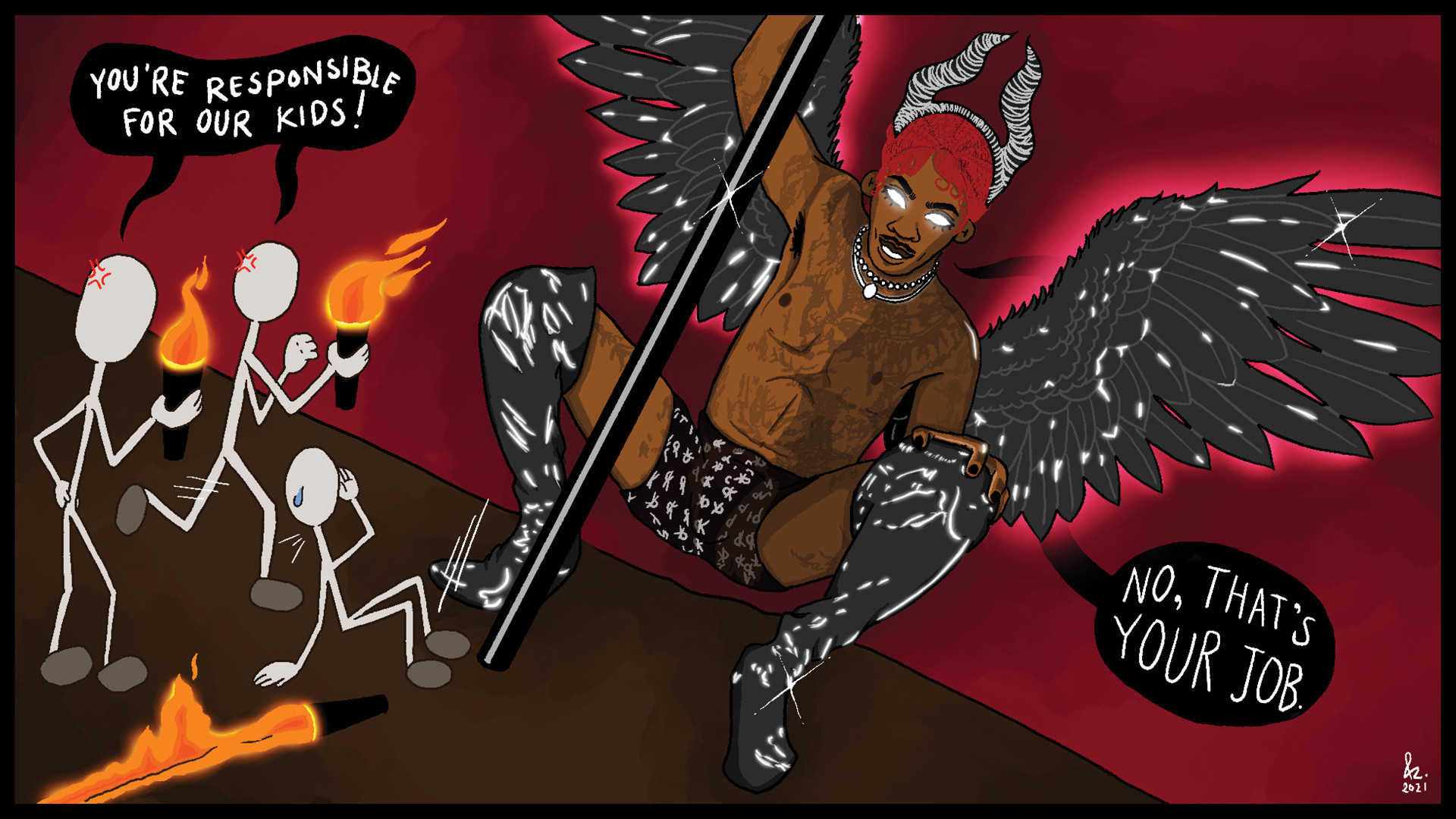
Montero Lamar Hill, a.k.a. Lil Nas X, has really stirred the pot this time.
When the Atlanta rapper and pop singer, 21, revealed his sexuality riding the high of “Old Town Road” (and all 500 of its remixes) in 2019, his popularity amongst the youth was already set in stone. OTR was the summer anthem of my time as a summer camp counselor; Gen Z’ers and in-between millennials could not get enough of this country pop bop. The older adults, however, has since branded him as an industry plant in the pop scene to further the “gay agenda.” (We’ll tuck this information in our back pockets for now.)
Cut to the present day, where Lil Nas X is trolling his followers and stan Twitter and keeping up with Tik Tok trends, and on March 26, the birth of “Montero” arrived.
The music video opens with a voiceover:
“In life, we hide the parts of ourselves that we don’t want the world to see. We lock them away, we tell them no, we banish them. But here, we don’t. Welcome to Montero.”
The backdrop to “Montero,” as Lil Nas X explains, is that he was taught to hate himself and be scared of what he identified with as an individual because of the judgment from Christians in his life, and their ideas of godliness versus ungodly. To get a good sense of what that means in context, Lil Nas X characterizes himself as Montero, playing every single character in the video. “MONTERO (Call Me By Your Name)” references numerous biblical motifs like Adam and Eve, Heaven and Hell, and the act of stoning someone as a punishment for sinning.
Montero, as he seduces himself as an “evil serpent,” is a kick to Adam and Eve being banished from the Garden of Eden for eating the fruit of the Tree of Knowledge. Basically, disrespecting God’s commands by being gay gets you ostracized and judged. As we watch one version of Montero running from another version of himself, an “evil” version, we’re watching Lil Nas X retell his story of how he was told how wrong it was to be himself.
Cut to pink-haired Montero in a porcelain amphitheater, surrounded by a bunch of Monteros in tall, bluish-silver 17th century Marie Antoinette wigs and hundreds more of screaming gargoyle Monteros, condemning him for his crimes — he’s suddenly stoned to death by objects including a crystal butt plug. His body starts to ascend to Heaven, with an angel welcoming him into glory. Instead of taking this literal high road, he takes the low road in black thigh high stiletto boots and briefs, sliding down a stripper pole into Hell.
Long story short, Deviant Montero gives Satan Montero a lap dance, before snapping Satan Montero’s neck and stealing his horns, crowning himself the new king of the underworld.
“If that’s where we belong, let me be the king of that,” Lil Nas X said in an interview with Black queer Youtuber, Zack Campbell, when reacting to the video.
Unfortunately, the message was lost in the art, for the sake of his individualism and representation.
Everybody and their momma has lashed out at Lil Nas X after the arrival of the music video because of its religious context. The Christian community has taught many LGBTQ+ members for hundreds of years that homosexuality and queerness is a direct defiance against God’s word. Many have probably heard one too many times the saying, “God made Adam and Eve, not Adam and Adam.”
In an online interview with music critic Anthony Fantano on his YouTube channel, “The Needle Drop,” Lil Nas X expressed that it was his intention to get people riled up with the video.
“I want to piss people off with this but I also want to make a point with this, too. I’m gonna be able to do this, I’m gonna keep going. I’m gonna still be here, you’re not going to cancel me,” Lil Nas X said to Fantano.
Lil Nas X was also placed in hot water for releasing a “Satan” shoe, in collaboration with the Brooklyn based art collective MSCHF, that is said to contain a drop of human blood mixed with ink in the soles of a pair of Nike Air Max ’97s. Within hours, all 666 pairs were sold. Nike received backlash from people who thought the brand was involved with the shoe’s design and release, and proceeded to hand out lawsuits to Lil Nas and MSCHF. Since April 8, the Wall Street Journals reports that the brand has dropped the suit filed against the rapper, with MSCHF agreeing to repurchase any Satan Shoes via a voluntary recall.
Before the release of the video, in a typed Notes app message he posted to Twitter, Lil Nas X writes a letter to his younger self while also addressing the “industry plant” rumor and “gay agenda” topic:
“dear 14 year old montero, i wrote a song with our name in it. it’s about a guy i met last summer. i know we promised to never come out publicly, i know we promised never to be ‘that’ type of gay person, i know we promised to die with the secret, but this will open doors for many other queer people to simply exist. you see this is very scary for me, people will be angry, they will say i’m pushing an agenda. but the truth is, i am. the agenda to make people stay the fuck out of other people’s lives and stop dictating who they should be. sending you love from the future.”
While the sentiment of this dramatic rollout should not be lost in the midst of the chaos, the truth of the matter is, with the constant itch for influencers and celebrities to be a voice for the “little people,” Lil Nas X has now fully put himself in the front of the young LGBTQ+ community and other Gen Z fans. Lil Nas X does understand that this personal message of nonconformity has now turned into a public statement of his place in the industry, explaining to Anthony Fantano that even though he knows that this song will place him as another voice for many young LGBTQIA+ people, he is still just like everyone else.
“I see myself as a role model, but I’m still 100 percent a 21-year-old kid who’s just now learning about the music industry. I’m definitely still going to fuck up, I’m still going to make mistakes. I’m still going to say things. I speak for me first, I speak for Montero first, everything else comes second.”
Sad to say that not everyone thinks this way, which is why the backlash was promoted by older adults, especially ones with children. The main argument between the Millenials and Boomers is who is responsible for influencing the younger generation, the parents or the influencers/celebrities. Lil Nas X responded to a tweet accusing him of being a product of the “system” targeting kids using a video of the rapper singing “Old Town Road” at a school. The tweet also compared him to former Disney Channel star Miley Cyrus, who performed for younger audiences during her days on the show Hannah Montana.
“There was no system involved. I made the decision to create the music video. I am an adult. I am not gonna spend my entire career trying to cater to your children. That is your job,” Lil Nas X said.
Younger Twitter users and Lil Nas X fans also had a field day memeing and trolling the naysayers, with one joking about the seemingly disproportionate thought of kids turning gay just because they are fans of the rapper, referencing a video from the adult animated comedy show, The Boondocks. Someone else took a more intellectual observation of the way modern culture uses satanic imagery, highlighting examples like the supernatural horror Netflix series, “The Chilling Adventures of Sabrina” and the music video for Billie Eilish’s song “all the good girls go to hell.”
The logical answer is, of course it is the job of a parent to raise their own kid. The issue comes down to the way kids consume content and entertainment nowadays. It is very different from how most of our parents, and definitely our grandparents, grew up. Gone are the days of letting your kid sit in front of the TV all day and only worrying about the “devil music” rock ‘n’ roll influencing them. No, these days, young Gen Zer’s main modes of communication and understanding of the world come from social media, leading with the video-sharing platform Tik Tok, which can serve as both educational and entertainment.
Short of homeschooling and going off the technological grid, there is not much parents feel like they can do to censor what influences their child in this advancing technological age. With this idea in mind, it’s understandable where the clash with the generation lies: the media itself.
With so many forms of media bombarding us with news, advertisements, updates, social commentary, influencer content and whatever else, it’s important to look deeper into this topic and ask ourselves what the problem is with how we are consuming this information rather than the what. Is it what’s in the media that’s doing the influencing or it is how much of it you’re letting yourself be susceptible to? If we feel like we can understand and process information and base well thought out opinions in the span of a 15- to 60-second video, then maybe we have bigger fish to fry than someone’s sexual identity or how they choose to express it.







